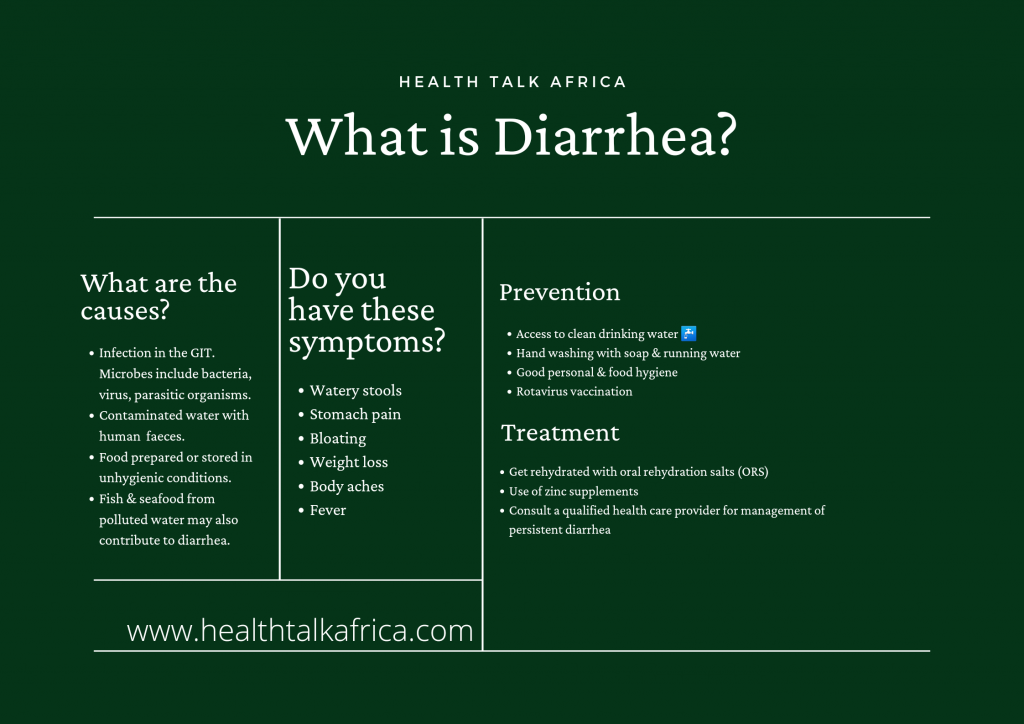Diarrhea is defined as the passage of three or more loose or liquid stools per day, or more frequent passage than is normal for the individual.
Diarrhea is usually a symptom of an infection in the gastrointestinal tract, which can be caused by a variety of bacterial, viral and parasitic organisms. Infection is spread through contaminated food or drinking-water, or from person-to-person as a result of poor hygiene.

Interventions to prevent diarrhea, include clean and safe drinking-water, use of improved sanitation and hand washing with soap can reduce disease risk. Diarrhea should be treated with oral rehydration solution (ORS), a solution of clean water, sugar and salt. In addition, a supplemental treatment course of dispersible 20 mg zinc tablets shortens diarrhea length and improves outcomes.
Diarrhea is one of the most common health complaints and the second leading cause of death in under-5 children. It can range from a mild, temporary condition to a potentially life threatening one. Dehydration is the most severe threat posed by diarrhea.
During an episode of diarrhea, the individual loses water and electrolytes -sodium, potassium, chloride and bicarbonate through liquid stools and/or vomit. A person with diarrhea becomes dehydrated when these losses are not replaced.
Types of Diarrhea
Clinically, there are three types of diarrhea, each with its specific treatments:
• Acute watery diarrhea, which may last several hours or days, and includes cholera.
• Acute bloody diarrhea, also called dysentery.
• Persistent diarrhea, lasting 14 days or longer
Causes
Infection: Many cases of diarrhea are due to an infection in the gastrointestinal tract. The microbes responsible for this infection include: bacteria, viruses, parasitic organisms. Most of which are spread by faeces-contaminated water. Infection is more common when there is a shortage of adequate sanitation and hygiene and safe water for drinking, cooking and cleaning. Rotavirus and Escherichia coli, are the two most common etiological agents of moderate-to-severe diarrhea in low-income/developing countries.
In the United States, the most commonly identified causes of acute diarrhea include: bacteria Salmonella, Campylobacter, Shigella, and Escherichia coli.
Other pathogens such as cryptosporidium and shigella species may also be important. Location-specific etiologic patterns also need to be considered.
Malnutrition: Children who die from diarrhea often suffer from underlying malnutrition, which makes them more vulnerable to diarrhea. Each diarrheal episode, in turn, makes their malnutrition even worse. Diarrhea is a leading cause of malnutrition in children under five years old.
Source: Water contaminated with human faeces, for example, from sewage, septic tanks and latrines, is of particular concern. Animal faeces also contain microorganisms that can cause diarrhea.
Other causes: Diarrheal disease can also spread from person-to-person, aggravated by poor personal hygiene. Food is another major cause of diarrhea when it is prepared or stored in unhygienic conditions. Unsafe domestic water storage and handling is also an important risk factor. Fish and seafood from polluted water may also contribute to the disease.
Symptoms
Diarrhea refers to watery stools, but it may be accompanied by other symptoms. These include:
• stomach pain
• abdominal cramps
• bloating
• weight loss
• fever
• body aches
• chills
Diarrhea is also a symptom of other conditions, some of which can be serious. Other possible symptoms are:
• blood or pus in the stool
• persistent vomiting
• dehydration
If any of these accompany diarrhea, or if the diarrhea is chronic, it may indicate a more serious illness.
Prevention
Key measures to prevent diarrhea include:
• access to safe drinking-water;
• use of improved sanitation;
• hand washing with soap;
• exclusive breastfeeding for the first six months of life;
• good personal and food hygiene;
• health education about how infections spread; and
• rotavirus vaccination.
Treatment
Key measures to treat diarrhea include the following:
• Rehydration: with oral rehydration salts (ORS) solution. ORS is a mixture of clean water, salt and sugar. ORS is absorbed in the small intestine and replaces the water and electrolytes lost in the faeces. In case of severe dehydration or shock, rehydrate with intravenous fluids
• Zinc supplements: zinc supplements reduce the duration of a diarrhea episode by 25% and are associated with a 30% reduction in stool volume.
• Nutrient-rich foods: the vicious circle of malnutrition and diarrhea can be broken by continuing to give nutrient-rich foods – including breast milk – during an episode, and by giving a nutritious diet – including exclusive breastfeeding for the first six months of life – to children when they are well.
• Consulting a health professional, in particular for management of persistent diarrhea or when there is blood in stool or if there are signs of dehydration.
Closing thoughts
Diarrhea is a common gastrointestinal problem that may get resolved with a range of home remedies and medical treatments. However, a person should see their doctor if they are experiencing acute bloody diarrhea or persistent diarrhea (lasting 14 days or longer).

I enjoyed reading this. Thank you sir